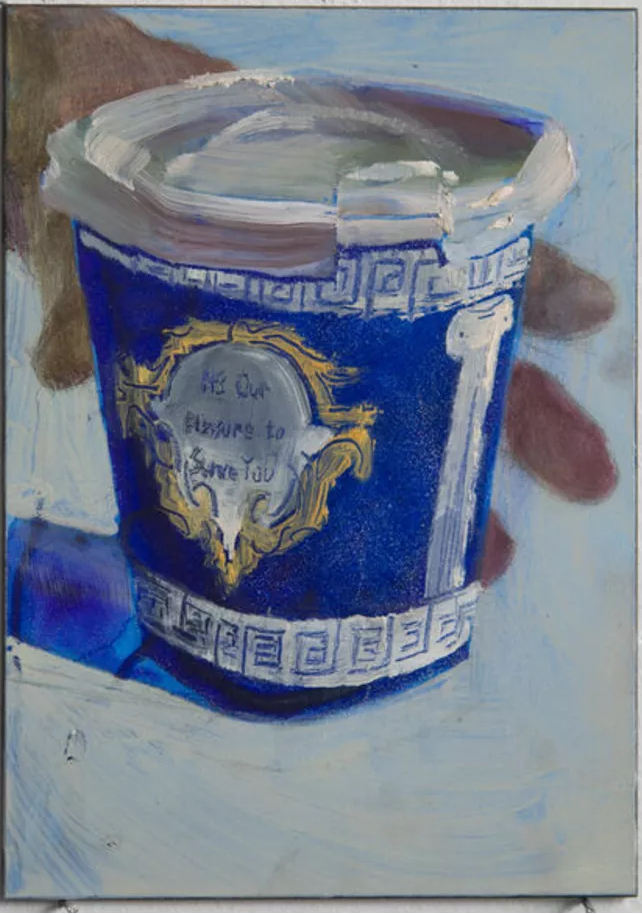Jeffrey Morabito, an artist with a unique cultural perspective, created It’s Our Pleasure to Serve You in 2020, a small but impressionable oil-on-board painting measuring just 7 × 5 inches. This work has garnered attention for its exploration of cultural symbols and themes of identity. Morabito’s multicultural background—being born to a Hong Kongese mother and an Italian father—deeply informs his artistic approach, blending Eastern and Western influences into a singular vision.
The Artist: Jeffrey Morabito’s Multicultural Roots
Jeffrey Morabito’s background is integral to understanding his artistic vision. Born in Bronxville, New York, he grew up between the United States and Hong Kong. His upbringing exposed him to a blend of cultures, which significantly influences his artistic exploration of identity, consumption, and cultural hybridity.
Morabito’s time in Hong Kong during his formative years introduced him to the vibrant aesthetics and philosophies of East Asia, while his Italian heritage brought an enriched history of Western art and classical techniques into his world. This duality manifests in his work, where traditional oil painting methods meet contemporary, culturally charged themes.
His body of work often reflects his personal experiences and broader societal observations, using familiar objects and symbols as vehicles for deeper commentary. This cultural connection is evident in It’s Our Pleasure to Serve You, where a mundane object becomes a profound symbol of identity and globalization.
The Artwork: It’s Our Pleasure to Serve You and Its Visual Elements
At first glance, It’s Our Pleasure to Serve You depicts a subject familiar to many: the iconic blue-and-white New York City coffee cup, commonly referred to as the “Anthora.” Designed in 1963 by Leslie Buck, this disposable cup is emblazoned with the words “We Are Happy to Serve You” and features a Greek-inspired motif, symbolizing hospitality and tradition.
Morabito’s rendering of this ubiquitous object elevates it from a disposable commodity to an artifact of cultural significance. Here’s a closer look at its key elements:
Composition and Scale:
Measuring just 7 × 5 inches, the painting’s small scale invites an intimate engagement with the viewer. The tight composition centers the coffee cup, making it the focal point of the piece.
Color Palette:
Morabito employs rich blues and whites to echo the original design of the Anthora cup but infuses the work with subtle variations and painterly textures. The interplay of light and shadow gives the cup a three-dimensional presence.
Brushwork and Texture:
The artist’s loose, expressive brushstrokes transform the simple cup into a dynamic subject. The visible texture of the paint creates a sense of movement and vitality, drawing attention to the materiality of the work.
Symbolic Details:
By reinterpreting the coffee cup in oil paint, Morabito imbues it with permanence and significance. The text “We Are Happy to Serve You” takes on a layered meaning, prompting questions about service, identity, and cultural exchange.
Themes Explored in It’s Our Pleasure to Serve You
Morabito’s painting transcends its subject matter, delving into themes that resonate on both personal and societal levels. These include:
Cultural Identity:
The Anthora cup, though Greek in design, has become a quintessential symbol of New York City. Its prevalence in diners and bodegas reflects the city’s immigrant history and cultural melting pot. For Morabito, the cup serves as a metaphor for hybrid identity, mirroring his own multicultural background.
Consumption and Globalization:
The disposable nature of the coffee cup highlights themes of consumption and waste. In a globalized world, objects like the Anthora cup become symbols of convenience and modernity but also raise questions about sustainability and cultural appropriation.
Everyday Icons:
By focusing on a commonplace object, Morabito elevates the mundane to the level of fine art. This approach challenges traditional notions of what is worthy of artistic representation, emphasizing the cultural significance of everyday items.
Hospitality and Labor:
The phrase “We Are Happy to Serve You” speaks to the ethos of hospitality but also underscores the often-invisible labor behind service industries. Morabito’s work prompts viewers to consider the human stories behind the objects they take for granted.
Exhibition and Reception
It’s Our Pleasure to Serve You was showcased by Space 776, a gallery known for promoting innovative contemporary art. The painting also appeared on platforms like Artsy, gaining recognition for its thought-provoking exploration of cultural symbols.
Critics and viewers have praised the work for its ability to provoke conversation while maintaining a visually appealing aesthetic. The painting’s small size belies its conceptual depth, offering layers of meaning that resonate with diverse audiences.
In 2020, Morabito also co-curated the “Food Show” at SFA Projects in New York, an exhibition that explored themes of consumption and culture. This curatorial work complements the themes of It’s Our Pleasure to Serve You, further solidifying Morabito’s interest in the intersection of food, identity, and art.
Cultural Significance of the Anthora Cup
To fully appreciate It’s Our Pleasure to Serve You, it’s essential to understand the cultural significance of the Anthora cup. Designed in 1963 by Leslie Buck, a Czech-American immigrant, the cup was intended to appeal to New York City’s Greek-American diner owners. Its design, featuring a classical Greek motif and the phrase “We Are Happy to Serve You,” quickly became synonymous with the city’s coffee culture.
The Anthora cup represents more than just a vessel for coffee—it’s a symbol of New York’s immigrant history, the labor of small business owners, and the city’s unique blend of cultures. By choosing this object as his subject, Morabito taps into a rich vein of cultural meaning, connecting personal identity with collective memory.
Comparison to Other Works in Morabito’s Oeuvre
It’s Our Pleasure to Serve You is part of a broader body of work in which Morabito explores themes of identity, consumption, and cultural hybridity. Similar pieces include:
•Bird’s Lament II (2020): This oil-on-panel work reflects Morabito’s interest in nature and its symbolic connection to identity.
•Curatorial Projects: Morabito’s involvement in exhibitions like the “Food Show” demonstrates his ability to translate personal themes into collective experiences.
These works share a common thread of elevating everyday objects and symbols, using them as lenses through which to examine broader societal issues.
Final Thoughts
Jeffrey Morabito’s It’s Our Pleasure to Serve You is a small painting with big implications. Through its depiction of a humble coffee cup, the work explores themes of identity, globalization, and the intersection of art and everyday life. Morabito’s ability to blend classical techniques with contemporary themes makes this piece a standout example of how art can provoke thought and dialogue.
The painting’s cultural resonance lies in its accessibility; it takes a familiar object and imbues it with layers of meaning, encouraging viewers to see the extraordinary in the ordinary. For Morabito, the coffee cup is more than just a vessel—it’s a symbol of his own multicultural journey and a reflection of the complex, interconnected world we live in.
As contemporary art continues to evolve, works like It’s Our Pleasure to Serve You remind us of the power of simplicity. By focusing on everyday icons, Jeffrey Morabito invites us to pause, reflect, and find meaning in the objects that shape our lives.
No comments yet.








